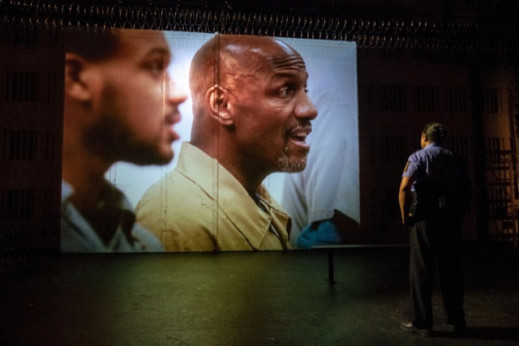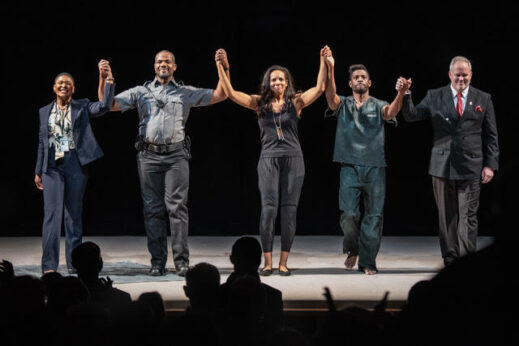
SANTA MONICA, Calif. — A touring production of Ludwig van Beethoven’s only opera Fidelio has just ended its four-city tour in February, with stops at the Metropolitan Museum of Art in New York City, the Mondavi Center at the University of California-Davis, the Scottsdale [Arizona] Center for the Performing Arts, and finally The Broad Stage in Santa Monica (seen Feb. 26).
 “Imaginative, vital, and heartbreaking,” wrote music critic Alex Ross in The New Yorker after seeing the Heartbeat Opera production. “I was blindsided by its impact.” Me too, and couldn’t have said it better.
“Imaginative, vital, and heartbreaking,” wrote music critic Alex Ross in The New Yorker after seeing the Heartbeat Opera production. “I was blindsided by its impact.” Me too, and couldn’t have said it better.
Beethoven (1770-1827) is often called a revolutionary, and indeed he was. His musical innovation and daring broke the rules of the Classical era—though not to diminish the radicals of that era too. Politically he aligned himself with the humanistic tradition of Enlightenment poets such as Friedrich Schiller, whose “Ode to Joy” is used in the Ninth Symphony, and Johann von Goethe. He was an early admirer of the ideals of the French Revolution insofar as they offered the more democratic idea of elective governance as opposed to royalism, and later famously denounced the imperial pretensions of Napoleon. In the sense that he embraced the notion of citizenship replacing subjection to a monarch’s presumed divine right to rule, he was a nationalist, a progressive stance for his time. Labor choruses around the world have taken the “Ode of Joy” into their repertoire.
The story, with an original libretto by Joseph and Georg Friedrich Sonnleithner adapted from the French of Jean-Nicolas Bouilly, is not complicated: Leonore is distressed by the imprisonment of her freedom-loving husband Florestan at the hands of the hated dictator Pizarro. (There is not much specificity as to time and place of the action, leaving listeners and directors a wide interpretive berth, but the choice of names suggests a highly authoritarian fascist-like state somewhere in the Spanish Catholic colonial realm.) She resolves to impersonate a young man “Fidelio” (loyal, faithful), and get a job inside the prison where Florestan is being held and tortured, and where he is now near death from starvation. She ingratiates herself to Rocco, the commanding officer, whose daughter Marzelline is attracted to this new addition to the staff. She uses her wiles to gain entry to the dungeon “annex” where Florestan is incommunicado in order to rescue him before the cruel warden Pizarro is about to have him killed. In the meantime, she has organized the opening of the prisoner cells to a brief hour of sunlight and fresh air the inmates can breathe in the courtyard. This famous “Prisoners’ Chorus” is one of the most memorable mainstays of radical music-making. Owing to Fidelio’s love and faithfulness, Pizarro’s plot is foiled at the last minute, Florestan gains his freedom, and the pair are reunited.
The original 1805 opera (revised in 1814 as the opera performed today) follows a traditional “rescue” plot that, aside from its overall serious subject, also contains some lighter characters taken from the world of popular musical comedy of the period (think Mozart’s fairly recent 1791 Magic Flute for a similar conflation of lofty Masonic themes with earthy preoccupations with food, drink, and sex). In its original conceit, the opera was called “Leonore” after its protagonist; several versions of the “Leonore” overture exist, which remain familiar orchestral staples frequently broadcast on classical radio stations.
The 13th Amendment
In the Heartbeat update, Leonore is now Leah, a young Black woman, whom we first encounter at her home desk, on the phone with a pro bono lawyer who refuses to take her case because he’s so overwhelmed that he can only accept ones with a chance of winning. Her husband Stan is a Ph.D. student affiliated with the BLM movement who was writing his dissertation on the 13th Amendment, and now he’s been wrongfully incarcerated by a white supremacist prison warden. He’s been researching Pizarro’s career as the mastermind behind a shady network of Ku Klux Klan-like right-wing fascist terror groups. Leah poses as Lee, retaining her female identity and cozying up to the CO’s lesbian daughter Marcy. The happy ending has been altered—there’s no such pat, reassuring solution to the urgent racial crisis in America within sight now to afford the luxury of sending audiences home all cathartically satisfied and complacent.
The role of Roc is pivotal here. In some ways, he is, if not the protagonist, the character through whom the audience experiences the drama. Twenty-five years into his prison officer career, he is coming to the end of his service, with all the aches and pains of a tired, middle-aged man who just wants to retire in peace and forget about the horrible things he has witnessed. He’s the complicit, go-along-to-get-along type who doesn’t want to get into any trouble at this late date with his corrupt, manipulative, and sadistic boss. Think of him, perhaps, as “the good German,” the 19th-century prototype of the 20th-century version of same—and not so different from the “good American” or anyone else who turns a blind eye to the crimes of their country. The fact that he is led—by Leah, but prompted by her as well to contact his innermost instinct for even the least human solidarity—to finally thwart his superior represents a turning point in his evolution, a reminder to the operagoer that to a lesser or greater extent we all have some degree of agency in our lives that we choose to utilize every day—or numbly choose not to.
Heartbeat Opera adapted Fidelio as a just under two-hour, intermissionless production that eliminates several smaller roles, reorchestrated the score to more portable chamber proportions, and refreshed the libretto for the Black Lives Matter era. Company member Ethan Heard is credited for the adaptation and direction, while Daniel Schlosberg takes credit for the new musical arrangement and music direction. The new English dialogue was co-written by Marcus Scott and Ethan Heard, although the musical numbers are retained in the original German (with titles in English). The German reminds us of how much the Nazi period was an aberration from the historically all-important heights of humanism and science achieved by that nation.

Kelly Griffin sings the dramatic soprano role of Leah, and Curtis Bannister (“I dared to speak truth and chains are my reward”) is her husband Stan. The prison personnel includes Derrell Acon and Victoria Lawal as the father-daughter CO Roc and Marcy, with Corey McKern as Pizarro (who wears a bigly long red tie!).
The single most moving and astounding casting solution in this opera, given that a whole traveling ensemble is not feasible to sing the beautiful “Prisoners’ Chorus,” is to feature the recorded voices of more than 100 incarcerated singers and 70 volunteers from six prison choirs across the Midwest. These include the Voices of Hope at the Minnesota Correctional Facility, Shakopee, Minn. (Amanda Weber, conductor); East Hill Singers at the Lansing Correctional Facility in Lansing, Kan. (Kirk Carson, conductor); Oakdale Community Choir at the Iowa Medical and Classification Center in Oakdale (Mary Cohen, conductor); and three choruses, all conducted by Catherine Roma: the Ubuntu Men’s Chorus at the London Correctional Institution in London, Ohio; the Kuji Men’s Chorus at Marion Correctional Institution in Marion, Ohio; and the Hope Thru Harmony Women’s Choir at the Dayton Correctional Institution in Dayton, Ohio.
Copies of letters by some of these singers were displayed in The Broad Stage lobby, expressing how much this project meant to them, almost literal “odes to joy” for the opportunity of singing such glorious music—in German! (As the reader must have surmised, the score was adapted to include women’s voices as well.) A video collage of the singers accompanied the soundtrack on stage on a makeshift screen erected inside the prison stage set. I can say with some assurance that I was likely not the only audience member with tears in my eyes seeing how earnestly these prisoners—many of them women and men of color—threw themselves into this deeply humanistic and liberatory project.
Schlosberg’s fresh orchestration—for two French horns, two cellos, two pianos, and percussion—channels all the essential emotional resonance of the original score. If the United States had anything like a Works Progress Administration, such as existed during the New Deal to provide employment all across the land and bring culture, through the Federal Arts Project, to hundreds of underserved communities, an opera like this could be reaching vast new audiences.

The set design by Reid Thompson merits a special mention, a cleverly adaptive collection of fencing with menacing razor wire, industrial staircases and a couple of desks pretty much do the trick, combined with a fine lighting system devised by Oliver Wason.
As for the singing, these five are all professionally trained performers profoundly committed to communicating with their audience, a focus that supersedes the necessity to produce each tone to rounded perfection. The goal is to stir, to motivate, to inform, and inspire. If they can’t do that, then why bother? I’m sure Beethoven had the same idea. Whatever they come up with next, watch out for Heartbeat Opera and check it out.
Even though the tour is over now, do yourself the favor of watching this trailer here for Heartbeat Opera’s Fidelio. This video, in addition, is specifically about the prison choir; it’s especially poignant.












Comments